财务煤气灯:晚年护理的金融化
IF 5.7
2区 管理学
Q1 BUSINESS, FINANCE
引用次数: 0
摘要
世界人口正在老龄化,老年人护理服务的提供和可持续性刻不容缓。与类似环境中的结构性改革一样,老年护理也受到金融化逻辑的影响,但很少有研究考察其在老年护理中的动员。根据向澳大利亚老年护理质量和安全皇家委员会提交的近900份意见书,我们提供了金融化如何在老年护理环境中呈现及其对老年人的影响的见解。该研究利用金融化的三个特征来探索其在这种背景下对日常生活的影响:家庭的“资产化”;将风险从国家转嫁给人民的选择修辞;以及金融知识的话语,它培养了管理养老的个人责任。我们认为,老年人在“财务上被误导”,认为提供老年护理是为了支持自主性、选择和信息对称,而实际上,老年护理的金融化涉及从个人到私人提供者的大量财富转移。考虑到退休时房屋所有权的不平衡,晚年行使知情选择能力的可变性,以及金融知识的范围,我们发现目前的模式将资助老年护理的责任转移到了需要护理的人身上。反过来,让人们对晚年所需的护理做出复杂的财务选择,确保实质性的财务风险转移到社区中最脆弱的人群身上。本文章由计算机程序翻译,如有差异,请以英文原文为准。
Financial gaslighting: The financialisation of care in later life
The world’s population is ageing, and the provision and sustainability of aged care services are urgent. Like structural reforms in similar settings, aged care has been subjected to the logics of financialisation, yet few studies examine its mobilisation in aged care. Drawing on nearly 900 submissions to the Royal Commission into Aged Care Quality and Safety in Australia, we provide insights into how financialisation presents in an aged care setting and its implications for older people. The study draws on three features of financialisation to explore its effects on everyday life within this context: the ‘assetisation’ of the home; the rhetoric of choice used to shift risks from the state to people; and the discourse of financial literacy, which has cultivated individual responsibility for the management of aged care. We argue that older people are ‘financially gaslit’ into believing that the provision of aged care is designed to support autonomy, choice, and information symmetries when, in reality, financialisation in aged care involves significant wealth transfer from individuals to private providers. Given the unevenness of home ownership at retirement, the variability in the capacity to exercise informed choice in later life, and the spectrum of financial literacy, we find that the current model displaces responsibility for funding aged care onto those in need of care. In turn, responsibilising people to make complex financial choices about the care needed in later stages of life ensures that substantive financial risks are shifted to those amongst the community’s most vulnerable.
求助全文
通过发布文献求助,成功后即可免费获取论文全文。
去求助
来源期刊

Critical Perspectives on Accounting
BUSINESS, FINANCE-
CiteScore
9.40
自引率
7.80%
发文量
91
期刊介绍:
Critical Perspectives on Accounting aims to provide a forum for the growing number of accounting researchers and practitioners who realize that conventional theory and practice is ill-suited to the challenges of the modern environment, and that accounting practices and corporate behavior are inextricably connected with many allocative, distributive, social, and ecological problems of our era. From such concerns, a new literature is emerging that seeks to reformulate corporate, social, and political activity, and the theoretical and practical means by which we apprehend and affect that activity. Research Areas Include: • Studies involving the political economy of accounting, critical accounting, radical accounting, and accounting''s implication in the exercise of power • Financial accounting''s role in the processes of international capital formation, including its impact on stock market stability and international banking activities • Management accounting''s role in organizing the labor process • The relationship between accounting and the state in various social formations • Studies of accounting''s historical role, as a means of "remembering" the subject''s social and conflictual character • The role of accounting in establishing "real" democracy at work and other domains of life • Accounting''s adjudicative function in international exchanges, such as that of the Third World debt • Antagonisms between the social and private character of accounting, such as conflicts of interest in the audit process • The identification of new constituencies for radical and critical accounting information • Accounting''s involvement in gender and class conflicts in the workplace • The interplay between accounting, social conflict, industrialization, bureaucracy, and technocracy • Reappraisals of the role of accounting as a science and technology • Critical reviews of "useful" scientific knowledge about organizations
 求助内容:
求助内容: 应助结果提醒方式:
应助结果提醒方式:


